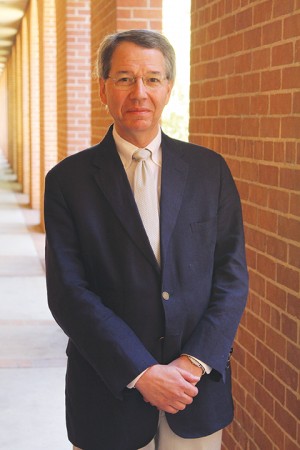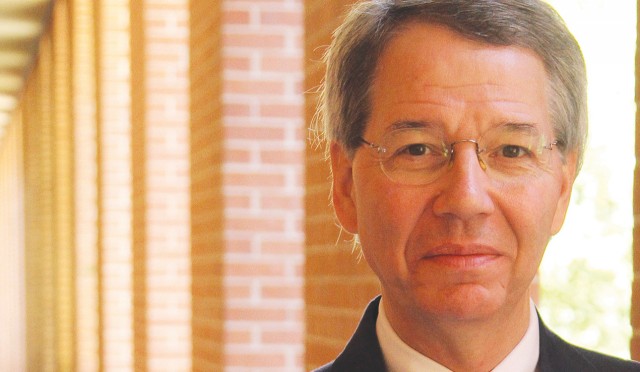
Travis Taylor | Lariat Photo Editor
Reporter
Dr. David Clinton is a professor of political science, studies international relations theory, American foreign policy, the art and practice of diplomacy and ethics and international relations. The Baylor Lariat asked Clinton to share some of his thoughts on the Syrian conflict.
In late August, the city of Damascus was hit by a chemical weapons attack which killed over a thousand people. The Obama administration has expressed interest in getting involved with the conflict in hopes of finding a resolution and preventing further attacks.
Q: America has decided that something needs to be done to help the mass murder of innocent civilians in Syria. Does America have any business interfering in what is, in essence, a civil war?
A: Let me talk in terms of whether it’s wise. I think it’s wise for the United States to intervene in the civil war, and I can see why, even though it’s a civil war, it could have effects outside Syria: refugee flows going into other countries, people fleeing the civil war inside Syria and then too many of them wind up in another neighboring country that is already poor. It could have destabilizing effects in, say, Jordan. So, it does have an international aspect to it.
There is also the concern that the Assad regime is supported by Iran, and Iran is in something of a competitor with the United States over influence in the Middle East and the Persian Gulf region. So, I can understand why people would say this is not just a domestic affair for Syria and, therefore, it becomes part of American foreign policy.
Having said all that, I still think it is wiser not to intervene with American military forces for reasons including the danger of an escalation that we really don’t want and that the President says now that we won’t have. Military interventions sometimes have a way of growing beyond what was originally conceived.
It’s a terrible thing that 1,400 people would have been killed with chemical weapons but if tens of thousands of people have been shot to death is that any less worse? If we didn’t think it was wise to intervene in that case, does this really create such a red line?
I think that certainly the United States should be concerned about this. It should be involved in efforts to try to bring the civil war to an end through some kind of diplomatic mediation. I’m even willing to listen to the case for providing some kinds of military assistance to the Syrian rebels, assuming that we can assure ourselves that the weapons won’t fall into the hands of forces that are even more opposed to us than the Syrian government is.
Q: What was your reaction to the graphic videos and photos that were released of the torture that is going on Syria?
A: Particularly horrifying photos or videos can affect public opinion. People in international relations talk about the CNN effect. People see something that’s really dramatic on their television screens and they demand that something be done about that. That forces the hand of the American government to intervene or to pull out or change something about what it’s currently doing.
Certainly those photos of the bodies of the victims of the chemical attack were quite terrible, and the video of the people who were still alive but were slowly dying from inhaling these chemicals were at least as horrifying.
Q: Do you think the graphic images could eventually be a deciding factor in the final course of action?
A: We’re talking with the Russians and having to negotiate the terms of a possible Security Council resolution.
The text of such a statement, how long any deadlines in it would be and whether there would be consequences for the Syrian government failing to meet those deadlines could take a long time.
All of this plus the actual inspection of the chemical weapon sites in Syria is going to take a while. The longer all of that goes on, the further into the past these horrifying photos recede, the less effect they have on American public opinion.
So, I would think that having entered into this process now with the Russians and the Syrians and others, we’re guaranteed the lessening of the emotional impact of those photos.
Q: Can America actually change the course of events of a civil war in another country through military or diplomatic methods?
A: I think that it is possible. There have been cases in which the United States, working with other countries, was able to achieve some measure of stability and cessation of violence in armed conflicts among participants within another country. Forces that were battling for control of that country, or cases in which a part of the country was trying to secede and the central government was fighting to prevent it from doing that.
In some cases, that’s resulted in a political settlement that left the country intact, and in some cases that resulted in a settlement that allowed for the peaceful separation of that part of the country.
There are cases of successful nonmilitary intervention and I’m very much in favor of following up those pathways.
Q: Do you believe the western culture can fully grasp the significance of the Syrian conflict without understanding the history of the Middle East?
A: A person really can’t understand what’s going on without having a much greater familiarity with the history, the culture, religion, the economics of this region that would be much greater than any non-specialist could have. That’s just true by the nature of things. Foreign policy involves distant, unfamiliar places.
It’s unrealistic to expect general public opinion fully to grasp those. The most the general American public opinion can do is try to find and put in office people whose judgment it respects in the belief that whatever unknown problems happen a year or two years from now, this person will have the wisdom to deal with them correctly.
Q: When history looks back on the moment, how do you think textbooks will explain this situation?
A: I might suggest that what they’ll say about this episode is that it demonstrates how much unexpected events can change the course of affairs.
Three weeks ago, nobody was talking about the kind of process that’s under way now.
Secretary of State John Kerry made what seems to have been an offhand comment about how the only way for the Syrian government to avoid military action is for it to give up all its chemical weapons, establish a verifiable process for making sure that it has done what it promised to do.
Well who knew that the next day the Russian government would pick up on this. It would propose a plan that it said would accomplish this very thing.
The American government then feels it has to respond to the Russian government and explore this possibility, so now we’ve had the secretary of state going over to Geneva, meeting with his Russian counterpart.
They’re hammering out a tentative, a preliminary agreement that now has to be put in real paper codified form and then approved by the United Nations and then actually carried out.
Well, all of this has come about not because of careful planning by the Russian government or the American government or anybody else, but by spur-of-the-moment seemingly unplanned events.
Whether this plan works or not, it has changed things from where they seemed to be headed three weeks ago.
The president asked for a resolution to authorize force. It looked like Congress was not going to give him such a resolution and the Security Council seemingly was not willing to endorse such an American action.
The administration was looking, therefore, at having to conduct some kind of military operation without the backing of either Congress or the Security Council.
Nobody is talking about all of this anymore and that’s not because somebody was working behind the scene months ahead of time to figure out how to make this change.
Q: What are the top three things you recommend that Baylor students learn and understand about the Syrian conflict?
A: I might say that none of the things they should learn is only about Syria.
- One, they should learn about the interrelation between diplomacy and the use of armed force anywhere and the limitations of both forms of power.
- Second, they should learn about the general importance of understanding culture and history in any foreign policy problem whether it’s Syria or not.
- Third, they should learn about the connections between domestic politics and international politics, the connections on the Syrian side, this domestic civil war spilling over to the outside world, the connections on the American side, role of Congress, how that situation developed so that the president felt impelled for domestic reasons to go to Congress and ask for a resolution authorizing the use of military force and how that whole effort has been undone by what happened internationally when the Russians jumped on this idea about a diplomatic solution.


